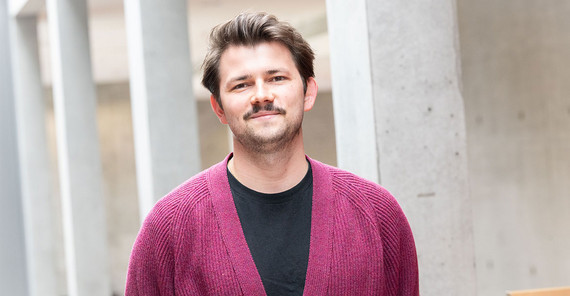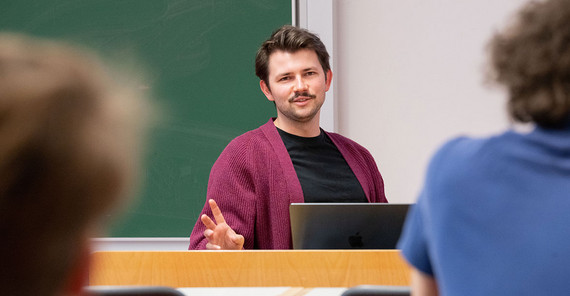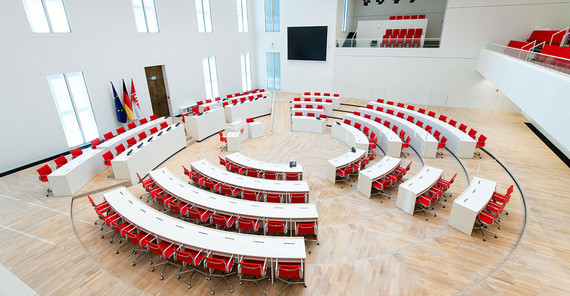From the seminar room on the first floor of Building 6 on the Griebnitzsee campus, you can see a small but dense grove. A seminar is taking place here, the aim of which is to show students how to navigate the jungle of political parties, mandates, draft laws, and minor and major inquiries. Seliger is not only interested in conveying the working methods and structure of the state parliament to his students. He places particular emphasis on addressing current political issues. “Part of the exam is a group project in which students deal with specific topics related to the state parliament and present their findings at the end of the semester,” he explains.
Politics Up Close
It started with a trip to the state parliament in Potsdam’s City Palace, which impressively underscores how practice-oriented Seliger’s seminar is. The visit was thoroughly prepared through several sessions on federalism, government systems in the federal states, and party politics in the Brandenburg state parliament. Once there, the students first took a tour of the building and then engaged in a discussion with SPD domestic policy officers in the state parliament. “The students asked a lot of questions—some in reference to their group work, others out of personal interest. There were also controversial questions, especially about the role of the AfD in the state parliament,” Seliger says, visibly satisfied.
Later in the semester, Brandenburg’s Federal Council coordinator, Thomas Hainz, came to Griebnitzsee and spoke about his experiences representing the interests of the state of Brandenburg at the federal level. The reason doctoral candidate Oke Seliger has such good connections in politics is that he worked in the Bundestag while still a political science student—first as an intern in the former Bundestag office of Minister Manja Schüle, and later as a research assistant to her successor, Sylvia Lehmann. In addition to his doctoral studies, he is researching how government structures change over time in the State-DNA project: “As a former Bundestag employee, I am particularly interested in the interaction between executive and legislative actors in the coordination of government policy,” Seliger says. In his research, too, practice and theory are inextricably linked.
“Political science distinguishes between horizontal and vertical cooperation: vertical refers to the representation of state interests at the federal level and within the EU, while horizontal refers to cooperation between states,” Seliger summarizes at the beginning of today’s seminar. Each session begins with a short review and time for questions. With eight registered participants, the course is relatively small, but the motivation is all the greater, as shown by the fact that the students closely follow state political news, engage in lively discussions about their group work topics, and have all apparently read the assigned literature and actively participate. Today’s topic: “State politics in crisis.” For this, the students search the state parliament’s online documentation system for motions and debates relating to Covid and evaluate them quantitatively and qualitatively. In general, Seliger has a refreshingly open attitude toward electronic tools in the social sciences, including artificial intelligence.
Not afraid of AI
The course syllabus includes information on the use of digital tools. However, instead of bans, it offers tips on which tools are suitable for which purposes—and which are not. “Artificial intelligence can be useful, but it cannot solve all problems. If you have your term paper written by ChatGPT, you can’t expect a very good grade,” Seliger explains his position on the controversial topic. Such tools are more useful for literature research, brainstorming, reducing anxieties about statistical software, and managing large amounts of data. In addition, it is difficult to prove AI use in a legally binding way. “That’s why I prefer to teach good research design and how to structure a paper as a solid foundation. Then students can later assess for themselves where the use of AI makes sense for their research projects.”
For his doctoral thesis, Seliger uses methods from computational social science, in which computer programs analyze large amounts of data and, for example, identify patterns in decision-making. In his case, he examines informal exchanges between politicians and how these influence their decisions. He is not worried that this process could undermine democracy: “The fact that we have so many parties makes decision-making more difficult and can result in a politics of the lowest common denominator. But at the same time, institutional interdependencies mean that we are less at risk of slipping into autocracy. That’s why I think we already have a solid system of government. Nevertheless, in these times of crisis, we should not stop thinking about the resilience of our democracy.”
Seliger is passionate about political science. Ultimately, this is what makes his teaching so vivid and gives his students orientation in the jungle of state politics.
Oke Seliger has been a research assistant at the Chair of Politics and Governance in Germany at the University of Potsdam since 2024.
The research group State-DNA at the Chair of Prof. Julia Fleischer investigates how government structures have changed since the 19th century.
More about "State-DNA" here: https://www.uni-potsdam.de/en/state-dna
This text was published in the university magazine Portal - Zwei 2025 „Demokratie“. (in German)
Here You can find all articles in English at a glance: https://www.uni-potsdam.de/en/explore-the-up/up-to-date/university-magazine/portal-two-2025-democracy



